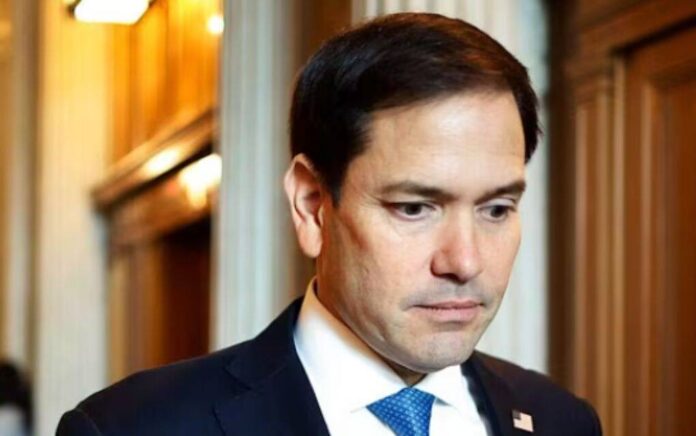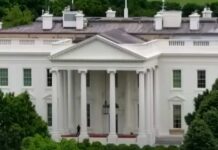
The Trump administration has been hard at work securing the nation. There’s more work to be done.
And the White House has teased new negotiations that the Trump haters thought were impossible.
Trump’s Deportation Push Gains Global Traction
The Trump administration is forging ahead with an ambitious plan to bolster national security by expanding its deportation efforts, seeking international partners beyond El Salvador to accept individuals removed from the United States. Secretary of State Marco Rubio, speaking at a recent Cabinet meeting, revealed the administration’s intent to collaborate with multiple countries to facilitate the transfer of deportees, particularly those with criminal backgrounds, as part of a robust immigration enforcement strategy.
“Not just El Salvador,” Rubio declared. “We are working with other countries to say ‘We want to send you some of the most despicable human beings to your countries.’” This statement signals a determined effort to extend the administration’s deportation framework, initially focused on criminals, to a more comprehensive approach that prioritizes the safety of American communities. The move aligns with President Donald Trump’s campaign promise to restore order and security through decisive immigration policies.
The administration’s strategy includes leveraging foreign prisons to house deportees, a tactic Rubio suggested would place undesirable individuals as far from U.S. soil as possible. “The further away from America, the better,” he noted, emphasizing the goal of protecting American citizens from potential threats. While Rubio did not name specific countries under consideration, the policy demonstrates a proactive stance in addressing the challenges of illegal immigration, particularly for nations unwilling to repatriate their citizens.
This initiative builds on earlier actions taken by President Trump, who in March invoked the Alien Enemies Act of 1798 to deport approximately 240 Venezuelan men, alleged members of the Tren de Aragua gang, to a high-security prison in El Salvador. The decision was driven by Venezuela’s reluctance to accept its citizens back, showcasing the administration’s willingness to take unconventional steps to enforce immigration laws. The El Salvador facility, known for its stringent conditions, serves as a deterrent to those who might consider illegal activities in the U.S.
Critics, including family members and legal representatives of the deported men, have raised concerns, claiming some individuals had no verifiable ties to the gang or criminal activity. They argue these men were denied adequate legal recourse before their transfer. However, the administration remains steadfast in its mission. “I’m not apologetic about it,” Rubio asserted. “We are doing that. The president was elected to keep America safe and to get rid of a bunch of perverts and pedophiles and child rapists out of our country.” This resolute position resonates with supporters who view the policy as a necessary measure to protect national interests.
Trump Admin Navigating Court Rulings Slowing Efforts Down
The case of Kilmar Abrego Garcia, a Salvadoran deportee mistakenly sent back to his homeland despite a judicial order permitting him to stay in the U.S., has sparked significant controversy. Abrego Garcia faced potential persecution from gangs in El Salvador, and his deportation has drawn scrutiny from lawmakers on Capitol Hill. The incident has fueled debates over the administration’s deportation processes, with critics questioning the accuracy and fairness of its implementation.
Despite calls from some quarters to reverse Abrego Garcia’s deportation, both President Trump and Salvadoran President Nayib Bukele have dismissed such demands. An April Supreme Court ruling mandated the White House to facilitate Abrego Garcia’s return, yet Trump, in a recent interview, acknowledged the possibility of compliance while maintaining a firm public stance against it. This nuanced approach illustrates the administration’s commitment to executive authority in matters of foreign policy and immigration enforcement.
When pressed on whether he had engaged with Salvadoran officials regarding Abrego Garcia’s case, Rubio was unequivocal in asserting executive privilege. “I would never tell you that. And you know who else I’ll never tell? A judge,” he stated. “Because the conduct of our foreign policy belongs to the president of the United States and the executive branch, not some judge.” This response reaffirms the administration’s belief in its constitutional mandate to oversee international relations without judicial overreach.
The Trump administration’s deportation efforts are part of a larger vision to strengthen America’s borders and prioritize the safety of its citizens. By seeking international partnerships, the administration aims to create a sustainable framework for managing deportations, particularly for individuals deemed a threat to public safety. The collaboration with El Salvador and potential agreements with other nations demonstrate a pragmatic approach to addressing complex immigration challenges.
Supporters of the policy argue that it sends a clear message to those who would exploit America’s immigration system: the U.S. will not tolerate criminal behavior or illegal entry. The administration’s willingness to explore foreign prisons as a solution reflects a creative and resolute strategy to overcome logistical hurdles, such as uncooperative governments. This approach has galvanized Trump’s base, who see it as a fulfillment of his promise to put America first.
Critics, however, continue to raise concerns about due process and the humanitarian implications of deporting individuals to countries with volatile security situations. The Abrego Garcia case, in particular, has become a focal point for those advocating for more transparent and equitable deportation procedures. Yet, the administration’s focus remains on executing its mandate, with Rubio and Trump emphasizing the primacy of national security over external pressures.
The Federalist Wire will update you on any news from the Trump administration in immigration policy.



















